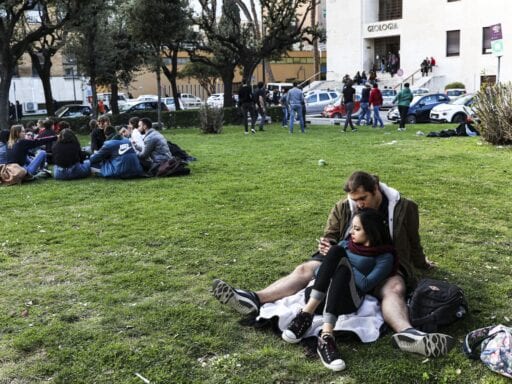The country has recorded more than 3,000 cases and more than 100 deaths.
Italy is shutting down its schools for two weeks, as the government works to contain the novel coronavirus outbreak that has hit the European country particularly hard.
Officials said the new coronavirus has infected more than 3,000 people and killed at least 107 in the country as of Tuesday. As a result, all schools, universities, and day cares will be shut starting Thursday and will remain closed until at least March 15.
“It is a prudent decision to contain the virus because we have a health-care system at risk of being overloaded,” Prime Minister Giuseppe Conte said in a statement Wednesday.
/cdn.vox-cdn.com/uploads/chorus_asset/file/19767644/GettyImages_1205083589.jpg) Tiziana Fabi/AFP via Getty Images
Tiziana Fabi/AFP via Getty ImagesItaly had already imposed similar measures in February in the northern part of the country — the epicenter of the country’s outbreak — and cities like Milan and Venice are basically under lockdown because of travel restrictions. This new directive expands the school closures nationwide and affects about 8.7 million students, according to Bloomberg. The Italian government has also banned fans from attending sporting events and some fashion shows.
Italy is the first country in Europe to take such sweeping measures, though France has closed around 120 schools in the most heavily affected areas of that country, the Guardian reports.
But many places in East Asia have already taken similar steps: Japan has closed schools for roughly a month, until early April; Hong Kong schools have been shut for weeks and won’t reopen until late April. China, too, has shuttered schools and deployed an online learning curriculum instead.
So far, children don’t seem to be particularly vulnerable to the coronavirus, at least relative to other demographics. According to the US Centers for Disease Control and Prevention (CDC), “There is no evidence that children are more susceptible. In fact, most confirmed cases of COVID-19 reported from China have occurred in adults.” (Covid-19 is the formal name for the disease caused by the novel coronavirus.)
But COVID-19 risk increases with age or with underlying medical conditions, according to the World Health Organization, with those 80 or older with the highest mortality rates, according to the available data from the WHO. Italy, in particular, has a large elderly population, which makes the country particularly vulnerable.
“Italy is a country of old people,” Massimo Galli, the director of infectious diseases at Sacco hospital in Milan, told the Guardian. “The elderly with previous pathologies are notoriously numerous here. I think this could explain why we are seeing more serious cases of coronavirus here, which I repeat, in the vast majority of cases start mildly and cause few problems, especially in young people and certainly in children.”
But there’s still a lot scientists don’t know about the virus and how it spreads, so governments like Italy’s are taking proactive and vigorous measures to slow the spread and rate of infections. And, public health officials believe that limiting access to places where a lot of people gather — like schools and other public events — is an effective tool.
“Children could amplify the epidemic, and carry the disease to their grandparents. Paradoxically, school closures help protect the elderly,” said Giovanni Rezza, who leads the infectious-disease department at Italy’s National Health Institute, told the Wall Street Journal. “We need to avoid a big wave of cases.”
The question with all these school closings is what the ripple effects will be, particularly for parents who work, and what that might do to the economy if the workforce is upended. “It’s right to close schools, but that has a cost,” Cristina Tagliabue, a mother of a 2-year-old and communications entrepreneur from Milan, told the New York Times. “The government could have done something for mothers — we are also in quarantine.”
Author: Jen Kirby
Read More



